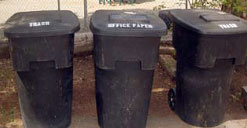Contact Pacific Southwest Waste Program
Pacific Southwest, Region 9
Serving: Arizona, California, Hawaii, Nevada, Pacific Islands, Tribal Nations
Solid Waste Management on Tribal Lands
Prevention and Reduction

Waste Exchanges
A waste exchange is a computer network or catalog that redirects unwanted materials to potential users. Most materials listed are used or excess manufacturing or construction materials. Organizations and individuals can usually list materials offered or wanted at no cost. These exchanges reduce disposal costs and allow others access to free or inexpensive materials. Many states and cities have established waste exchanges.
More Information
For more information on tribal waste reduction, see the Tribal Decision-Makers Guide to Solid Waste Management, Chapter 5.
Tribal Example

When the City of Folsom, California, mandated that their garbage service provide smaller bins, the city was left with hundreds of 90-gallon roll-off bins and no use for them. The Pit River Tribe saw the bins posted for free pickup on CalMax and realized they could use them. The Tribe picked up about 100 of the bins, valued at about $100 a piece, set aside some of the bins for their senior complex and plans to sell the rest to Tribal members for $25 a piece. The revenue will be used to supplement the Tribe’s solid waste and recycling program.
Another type of waste exchange is a local reuse center where individuals can donate excess or used materials that can then be used by schools, senior centers, or other nonprofit agencies. Donating or selling used items to secondhand stores is also a great way to reduce waste. This type of network can be used by tribal governments as well as advertised to tribal communities. This can be a great resource for households to get rid of unwanted but still functional items, which in turn reduces the amount of waste needing to be managed by the tribe.
Regional Material Exchange Web Sites
- Freecycle

- Craigslist

- General Services Administration (GSA)
- California Materials Exchange (CalMax)

- Recyclers’ World

Pollution Prevention
Pollution prevention (P2) means reducing or eliminating waste at the source by modifying production processes, promoting the use of non-toxic or less-toxic substances, implementing conservation techniques, and re-using materials rather than putting them into the waste stream.
Pollution Prevention Resources
- Pollution Prevention in EPA’s Pacific Southwest Region
- The Tribal Pollution Prevention (P2) Workgroup consists of environmental professionals from tribal entities, local, state, and federal agencies, academia, and not-for-profit organizations whose mission is to work collaboratively with tribes throughout the United States in reducing the environmental and health risks associated with the generation of waste in tribal lands. The workgroup was formed in December 2003 from an EPA grant issued as a result of tribal requests for more specific tribal communication about P2 efforts directly relating to tribes. The major task of the workgroup is to identify and address the environmental issues affecting the tribal nations using pollution prevention methodologies. A geographically dispersed team, the group meets monthly via conference call. If you would like to be a part of this opportunity, please send an email to
Sara Johnson (sara.johnson@des.nh.gov)
The workgroup has reviewed and agreed to the following specific deliverables:- Creation of an online discussion group and Web portal (www.tribalp2.org)

- Establishment of tribal mentor programs;
- Collaboration with P2Rx on Tribal Sector Hubs; and
- Work to gather and establish P2 results and metrics.
- Creation of an online discussion group and Web portal (www.tribalp2.org)
- Pollution Prevention Resource Exchange
 A national network of regional centers providing specialized information, practices, contacts, referrals, conferences, training, and networking options.
A national network of regional centers providing specialized information, practices, contacts, referrals, conferences, training, and networking options. - P2 GEMS
 An Internet search tool for facility planners, engineers and managers who are looking for technical and materials management information on the Web.
An Internet search tool for facility planners, engineers and managers who are looking for technical and materials management information on the Web. - National Pollution Prevention Roundtable (NPPR)
 Largest membership organization devoted solely to pollution prevention. Provides a national forum for promoting and developing P2 efforts.
Largest membership organization devoted solely to pollution prevention. Provides a national forum for promoting and developing P2 efforts.
